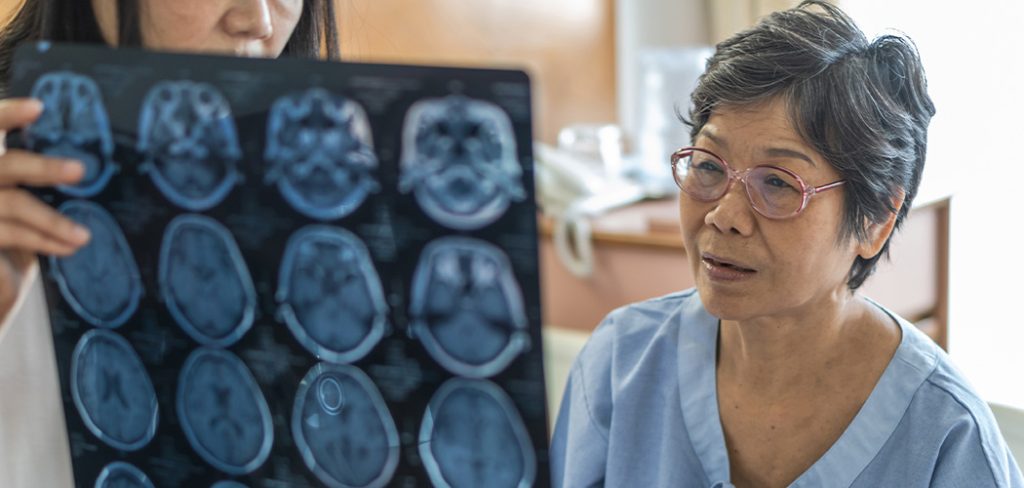Looking back, Laura Birchall believes she experienced years’ worth of MS symptoms that she simply dismissed at the time.
“After I exercised my arms and my legs would be really tingly and my vision would go really dark, and I just thought it was because I was really bad at cardio,” she recalls.
“When I was in the shower, I couldn’t feel my legs and I thought, ‘I really need to stop having such hot showers’. I had a number of bouts of fatigue that were enough for me to go and see my doctor but because they self-resolved I didn’t end up thinking more about it. I carried on with my life.”
Laura was fortunate that her GP recognised the sometimes-subtle early signs of MS, which eventually led to a formal diagnosis.
“Waiting for a diagnosis had an enormous impact on me, I suppose emotionally, my ability to focus, my ability to work,” she explains.
“From when I’d had a first appointment with my GP to talk about the possibility of MS, I had six weeks off work just to give myself enough time and space. I think there was a fair bit of denying that anything could possibly be wrong, but also at the same time, trying to process what it would be like to not have the future that I’d imagined and start to imagine a world where I didn’t know what I would lose, or what capability, what functionality, I would have later in my life, and trying to imagine whether I would be able to work, whether I would be able to see my friends, whether I’d be able to leave my apartment and go out in the world.”
On today’s World MS Day, MS Australia has released a new report showing that the average time from onset of symptoms to an MS diagnosis takes nearly four years, prompting urgent calls for increased investment in MS research and greater awareness of the disease.
The ‘My Diagnosis’ report draws on data from the Australian MS Longitudinal Study (AMSLS), a survey-based research study established in 2002 that collects real-life data from 2,500 people living with MS.
Since the introduction of the first disease-modifying therapies (DMT) for MS treatment in 1996, the average time to diagnosis has reduced from five years and almost four months in 1997-2000 to three years and almost 11 months in 2017-21.
More than 33,000 Australians live with MS, the most commonly acquired chronic neurological disease affecting young adults, and rates are on the rise.
MS symptoms can include severe pain, walking difficulties, debilitating fatigue, partial blindness and cognitive issues.

According to MS Australia, being able to accurately diagnose and halt MS at an earlier stage has enormous potential to significantly reduce the burden of the disease on people’s quality of life and the economy.
“In MS, time is brain. We know that the longer it takes to get a diagnosis of MS, the greater the risk of neurodegenerative damage occurring, and disability accumulating, which can ultimately diminish a person’s quality of life,” says Dr Julia Morahan, Head of Research at MS Australia.
“So, if you are finding that you have some symptoms, we would urge everybody to make sure you get yourself checked, get yourself to a GP, have a conversation, have those follow-up tests, because it’s really important that we get this gap closed for diagnosis.
“Education and awareness for families, for friends of people that may be having symptoms for first line healthcare professionals, like nurses and GPs, all of that information needs to be at their fingertips so that if somebody comes in and they’re a potential person living with MS, they can go through that diagnosis process as quickly as possible and get the outcomes.”
Associate Professor Vilija Jokubaitis from Monash University’s Department of Neuroscience, believes that breakthroughs in earlier diagnosis are possible with better resourcing, the establishment of MS biobanks and more financial support for research in MS.
“Greater research investment will support efforts to uncover more accurate biomarkers that are specific to MS,” he argues.
“These biomarkers might be fluid, MRI or imaging biomarkers that have a very specific signal that can differentiate MS from other neurological conditions.”
Now living with the disease, Laura encourages others to look out for the warning signs, trust their gut, and get to a GP asap to get checked.
“I think if something feels a little bit off, even if it’s not stopping you from doing your day-to-day activities, if there’s been a change, if something doesn’t feel right, talk to people in your life about it and listen to them when they tell you to go to the doctor.”









One Response
I have a lot of symptoms of MS, had an MRI but only as far as brain and cervical, the images were bad and only side views not a spine. No brain legions. My Dr didn’t even read the report but looked at images which I’m sure he had no clue to do ( sorry but he only likes to put you on drugs) he says they make a pill for everything now days what do you want and what do you want me to do. I’m struggling to find a decent Dr. I have slurred speech, spasms in my torso and the feeling of crawling 24/7 in my back, I twitch or shake, my hands move on their own. My right leg feels cold and has now spread up to my thigh and today felt in my back. I have trouble swallowing and dry coughing but they said that’s because I have GERD. I’ve had stomach issues forever that effects my bowel I’ve had incontinence so saw a urologist they put me on tablets a few years back. I’m getting headaches constantly. Dry mouth and tongue. Have trouble eating now and food digesting which causes nausea. Can’t sleep I stay up till 4am it’s 2am as I write this. Fatigue, I stumble a lot hit the walls or I just say the house is attacking me today because I miss judge where walls are. Vision gets blurry sometimes but not always have to keep blinking, dry eyes but constantly weeping at the corners. Pain I’m my joints like elbow, have acute pain in my left foot but that’s a torn plantar fascia and spurs but it won’t heal had since 2021. Get shooting pains in my legs at night out of the blue, hate direct sunlight now. Hands are stiff and weak get neck and shoulder spasms. That’s all I can think of because these I have daily and have had most since 2015 or longer but I’ve gotten worse with slurs and stumbling over words, that’s more like I go to speak but I stumble and no words come out or if I do it’s slurred or really slow in delivering but it doesn’t happen all the time.